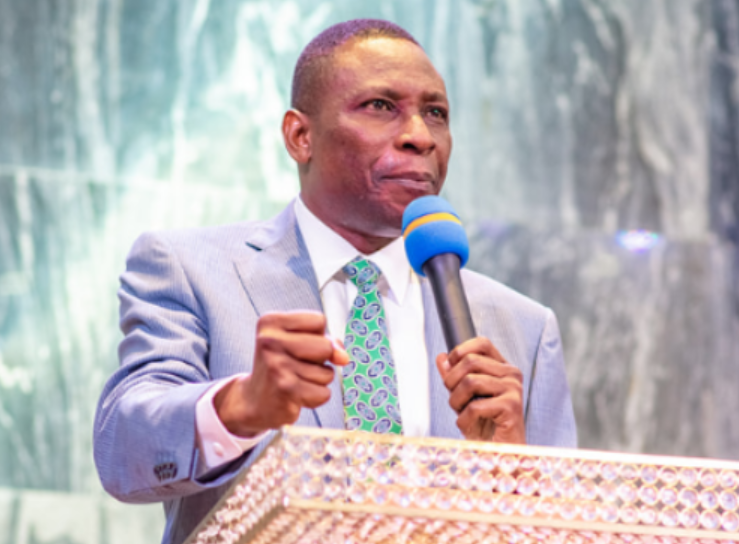The Economic and Financial Crimes Commission (EFCC) has denied reports that it accused parties involved in the OPL 245 trial of bribing its prosecutor, Offem Uket, to sabotage the case.
In his ruling, Abubakar Kutigi, a judge of the FCT high court, upheld the no-case submission of the defendants and dismissed the charges, chiding the EFCC for wasting four years on a trial without providing evidence.
After the ruling, reports surfaced online that the commission had sacked its prosecutor for collecting bribes from Mohammed Bello Adoke, former attorney-general of the federation, and Wole Olanipekun, the lead counsel of Aliyu Abubakar, among others, to bungle the case.
NewMailNG had previously reported an EFCC official saying the prosecutor was not sacked.
Uket was out of contract, according to the source, but the commission did not renew it because the chairman, Ola Olukoyede (pictured), was unhappy that he conceded that there was a paucity of evidence for the case to proceed to trial.
In its first official pronouncement on the controversy, the EFCC, in a statement issued by Dele Oyewale, its spokesman, said the public should ignore “effusions of mischief makers on the matter” and await the next course of action.
He said the commission is reviewing the case.
Oyewale wrote: “The Economic and Financial Crimes Commission, EFCC, has commenced a review of developments around the Malabu OPL 245 fraud case, including the dismissal of the charges against a former Attorney General of the Federation and Minister of Justice, Bello Adoke by a Federal Capital Territory High Court, Abuja and the conduct of the prosecuting counsel, Offem Uket.
“The review will entail exploration of the option of appeal and possible change of counsel in view of the Commission’s dissatisfaction with the handling of the case by Uket.
“Nevertheless, this intention has no nexus whatsoever to the spew of speculations imputing compromise by parties to the charge, currently making the rounds in some sections of the media.
“EFCC is not obliged to embrace such narratives, as it neither accused any of the parties of any unsavoury conduct nor made any conclusive statements about any investigation on the matter. The public is enjoined to ignore the effusions of mischief makers on the matter and await the next course of action.”
‘FOUR YEARS WASTED’
Delivering his ruling on March 28, 2024, Kutigi chastised the EFCC for filing “frivolous” charges.
Kutigi upheld the no-case submission filed by Adoke and dismissed the charges of fraud, bribery, and conspiracy against the former minister on the grounds that the EFCC failed to adduce credible evidence to prove the allegations contained in the charge.
Although the judge commended the prosecution for conceding that it did not have sufficient evidence to oppose the no-case application by Adoke, he criticised the anti-graft agency for wasting four years prosecuting the case.
The judge added that the defendants ought not to have been charged in the first instance.
The judge further noted that a charge must not be filed just for the purpose of filing, adding that a frivolous charge does damage to the judicial system. “It is argued that people can be arrested circumstantially,” the judge said.
“But every trial, more so a criminal trial, is a different ball game that must be undertaken with the utmost care and attention to details, particularly, the quality of the evidence and the availability of witnesses.
“It cannot be right or fair, that in this case, for example, nearly about 30 counts in the case involving forgery, the documents subject to these counts were not presented in evidence, and material evidence led to situate the elements of forgery.
“If, as stated by the lead investigator, PW10, they demanded about 37 documents from the CAC but only a few were made available, this then begs the question: why will a charge be filed involving those documents the prosecution does not have access to?
“I must therefore make the point that the whole trial process, whatever its inherent imperfection, is entirely evidence driven, evidence that requires quality and probative value.
“This is so whether it is at this stage of situating a prima facie, as in the present situation, or at the point of determining guilt, or otherwise of the defendants. Without evidence in either of the two situations, it is self evident that such a case stands compromised ab initio.
“On the whole, the prosecution has failed to prove the essential elements of the offences for which the defendants were charged, and accordingly, the no-case submission has considerable merit and must be sustained.
“To allow this proceeding to continue with regard to the totality of evidence laid bare on the record by the prosecution is to inflict undue hardship and injustice on the defendants.
“They ought not to have stood trial in the first place if the evidence on record was all the prosecution had to offer.
“The legal consequence of a successful submission of no case to answer is that such a discharge is equivalent to an acquittal, and dismissal of the charge on the merits.
“In my final analysis, and for the avoidance of doubt, my firm decision on the basis of the provision of Section 302 of the ACJA 2015 is that the evidence adduced by the prosecution on record is not sufficient to justify the continuation of this trial.
“For this reason, I hereby preclude them from entering upon their defence. And accordingly, I hereby dismiss, and discharge the defendants of all the entirety of the charge preferred against them.”
The case was filed in 2020, but the charges were amended several times within one year.






